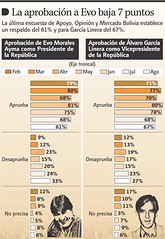Evo's approval ratings
09.01.2006Technorati tags: Bolivia politics Evo Morales
Bolivia's constituent assembly, installed earlier this month following the July elections, continues to drag on in procedural matters. What's more, local regionalist anti-governments protests (including a strike by the city's municipal employees) are adding continual tension to the already polarized political process. Then things got ugly in Sucre yesterday.
A group of MAS & MBL assembly delegates, walking through the city's central plaza, met a picket line of municipal employees. After an exchange of political insults, some of the protesters physically attacked at least three of the "officialist" (pro-MAS) assembly delegates. Even vice president Alvaro García Linera was whistled at (an insulting gesture) by crowds of campesinos and indigenous as he arrived to negotiate w/ the regionalist's demands.
The result were calls to move the constituent assembly from Sucre (the constitutional capital) to Cochabamba. Evo has flatly refused to this, citing the illegality of such a move. Of course, such a move would further anger sucrenses (citizens of Sucre), and perhaps drive Chuquisaca further into the anti-government regionalist bloc led by Santa Cruz & Tarija.
Here's a series of articles in La Razón. And this article in Correo del Sur is troubling: Efforts by MAS to impose a simple majority rule for decision-making in the assembly led to some scuffles in parliament between MAS delegates and those of Podemos, MNR, CN, AS, and UN; the MAS party whip (Roman Loayza) took a fall. Clearly, things are heating up.

![]() Meanwhile, Evo's approval ratings have declined to their lowest points since he took office earlier this year. While he still has relatively high levels of support — particularly for Latin American presidents — his drop from a high of 81% in May to 61% in August is significant. Especially since the poll was conducted in the "eje troncal" (La Paz, El Alto, Cochabamba, Santa Cruz). More strikingly, Evo's disapproval rate has risen dramatically from a low of 9% in February to a high of 33% in August. For those that have pointed to Evo's poll numbers as a sign of his political strength or legitimacy, these new numbers raise serious questions.
Meanwhile, Evo's approval ratings have declined to their lowest points since he took office earlier this year. While he still has relatively high levels of support — particularly for Latin American presidents — his drop from a high of 81% in May to 61% in August is significant. Especially since the poll was conducted in the "eje troncal" (La Paz, El Alto, Cochabamba, Santa Cruz). More strikingly, Evo's disapproval rate has risen dramatically from a low of 9% in February to a high of 33% in August. For those that have pointed to Evo's poll numbers as a sign of his political strength or legitimacy, these new numbers raise serious questions.
Possible causes for Evo's declining popularity include: slow delivery on campaign promises (the Achilles heel of any president), growing polarization between the central government & autonomist regional movements, the change away from the "gas-for-sea" policy towards Chile (recently he's gone back to it), and problems w/ his nationalization policies (including allegations of mismanagement at the state-owned YPFB). It's clear that the exercise of power is eroding Evo's support — as it does any executive — but it remains unclear what this means for the recently-elected constituent assembly.
Posted by Miguel at 09:43 AM
Comments
I think the fall in approval rating is closely related to his stubbornness in standing behind Alvarado and Patxi. Everyone is still talking about the attack on the Catholic Church and how he really mishandled this topic.
Posted by: eduardo at September 1, 2006 12:12 PM
Wish you and Tio German could have some discussions! He's pretty involved in politics right now!! We've suggested he read your blog
Posted by: mom at September 2, 2006 09:48 PM
Post a comment